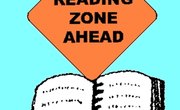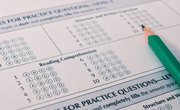Inferential questions present more of a challenge to students than standard comprehension questions. To effectively answer questions of this variety, students must take information from a passage and translate it, using it to create an inference, or educated guess. To increase your students' likelihoods of success in answering inferential questions, don't simply pose these questions, but instead start by engaging students in activities designed to help them build their inference skills.
Pause and Predict
Some inference questions require prediction skills. Help your students become more adept predictors by engaging them in a pause-and-predict activity. Prior to reading the next story that you plan to tackle as a class, go through the passage and mark different stopping points. Ask students to get out sheets of paper prior to beginning the story. Read the story aloud. As you get to these stopping points, ask students to set down their books and write predictions as to what will happen next. Allow students to share these predictions before proceeding with the reading, asking them to explain their reasoning behind each.
Character List
Inference questions often require students to make educated guesses about characters based on information about these characters presented to them. Help your students read more critically, paying more attention to details given about characters, by creating character lists. At the conclusion of a reading passage, divide students into groups of two to three. Assign each group a character. Ask the groups to list as many details as they can about the characters in question, looking back to the passage for help if necessary. After creating these lists, instruct groups to make four inferences about the characters based upon their lists. For example, a group could infer that a character is physically fit if the passage mentions the character's love of sports often.
Group and Infer
Make inference a cooperative practice, giving the students who need assistance with the skill the opportunity to learn from their peers. After reading a passage as a class, divide students into groups, carefully pairing the students who are strong at inference with those who struggle. Ask each group to create a list of 10 things they could infer based upon the reading.
Inferential Question Writing
Help your students better understand inference by asking them to write their own inferential questions. After presenting students with numerous examples of inferential questions so they can see what questions of this type look like, give students index cards and ask them each to write one inferential question that relates to a passage you read as a class. Collect all of the index cards and read over the questions, ensuring that the questions listed are actually inferential. Then read the questions aloud to students, allowing them to work together to answer the questions.
Related Articles
References
Writer Bio
Erin Schreiner is a freelance writer and teacher who holds a bachelor's degree from Bowling Green State University. She has been actively freelancing since 2008. Schreiner previously worked for a London-based freelance firm. Her work appears on eHow, Trails.com and RedEnvelope. She currently teaches writing to middle school students in Ohio and works on her writing craft regularly.










